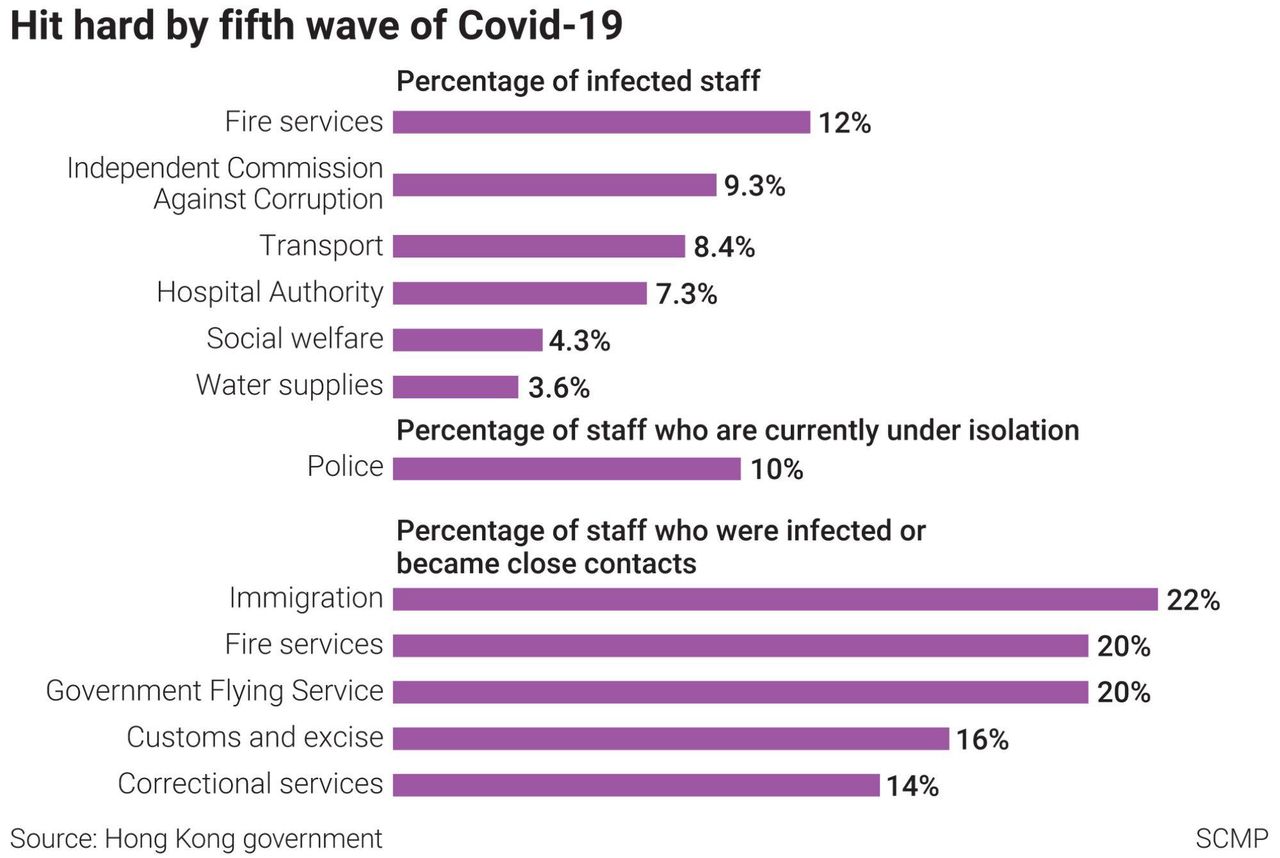Hong Kong News

How leadership failures left Hong Kong at the mercy of Omicron
Since 1997, Hong Kong has yet to confront a more serious non-political issue than the pandemic. On the heels of the 2019 protests and the aftermath, which considerably damaged confidence in our city, the way we have handled the latest wave of Covid-19 has put more doubts in the minds of the global community. Let me provide some perspective on the present mess.
Why does Hong Kong have to follow mainland China’s strategy of “dynamic zero infection”? Why can’t we, like the rest of the world, move towards herd immunity? As an entrepot and an international city, we rely on both the West and the mainland for our economic well-being.
For example, the former is a supplier of capital and the latter its users. Transactions often take place in Hong Kong. However, there is an additional critical dimension to our relationship with the rest of China. Many of our citizens commute across the border to work each day, and children likewise cross the border to attend school.
In other words, while our connection with the West is predominantly economic, that with the mainland is both economic and social. The border between Hong Kong and Shenzhen is also among the busiest border crossings in the world.
With that being the case, choosing to relax travel restrictions with the mainland instead of the rest of the world is evidently more crucial for Hong Kong. Given the divergent policies in tackling the pandemic, we can only choose one side.
With the “dynamic zero” approach, we have to impose strict quarantine rules and travel restrictions, thus largely closing our borders with the rest of the world. The economic consequences are dire, but if this means we can have free access to the mainland, then it should be worth it.
Unfortunately, primarily because of poor local leadership, we have failed to meet the mainland’s requirements. Consequently, we are essentially closed off from everyone. Hong Kong is truly caught between a rock and a hard place.
What Hong Kong is experiencing in the fifth wave of the pandemic is not unlike what the West went through two years ago. It is just worse here, and for unjustifiable reasons. Hospitals are overwhelmed, the death rate is high and citizens’ livelihoods are seriously affected.
What makes our case unjustifiable is that, in 2020, no one knew what the virus was like and there was no vaccine. That is no longer the case today. The plain fact is our government has not handled the pandemic competently, even to this day.

There are two criteria to achieve dynamic zero infections. First, the necessary infrastructure must be put in place, including a high percentage of vaccinated citizens, effective systems for new case detection and contact tracing, physical arrangements such as enlarging temporary hospital capacity and timely, appropriate communication with the public. Second, the government must act decisively once new cases surface.
Our leaders did none of that. In fact, they inexplicably resisted many of them. Consequently, we were caught totally unprepared when the highly contagious Omicron variant arrived. It is too late to build the infrastructure mentioned above for this wave as the virus is already everywhere.
At the root of our problem is leadership. I know many of the top officials, and I do not believe the problem is primarily one of their ability. It is more to do with personality – specifically a lack of humility and an overabundance of unfounded self-confidence. These are lifelong traits for some of our leaders.
There might also be a measure of superiority vis-à-vis the mainland. They forget that the mainland has done far better than many other large countries. China only has a little over 110,000 Covid-19 cases and less than 5,000 deaths. The comparable numbers for the United States are almost 80 million cases and more than 950,000 deaths.
One might rightly ask how much a life is worth. If there is any silver lining in our present mess, it is for Hong Kong to recognise that, in many critical areas of governance, China is among the world’s best.
In the long run, humanity will have to learn to live with Covid-19. That much we know, but what is unknown is how it will evolve. Those who have chosen the herd immunity approach have no choice but to face whatever newer strains may come.
Let us hope that any future variants that might come will be less deadly, but what if they are not? China, on the other hand, still has a choice to continue to fight the pandemic with “dynamic zero” policies or to change course.
It will depend on the way the virus mutates and whether Beijing can devise a more effective vaccine. If the Deltacron variant – which was discovered two months ago in Europe and is thought to be lethal like Delta and contagious like Omicron – becomes the next dominant strain, there is no reason for Beijing to reverse direction.
For now, it is still too early to tell. With so much weighing in the balance, it is better to be safe than sorry on this one.
So what should we do in Hong Kong? The present administration has less than four more months in office. We can only hope the pandemic will die down naturally by then, which is not unheard of in history. With hope, the next administration from July 1 will be more competent. Unfortunately, we just have to wait it out.











